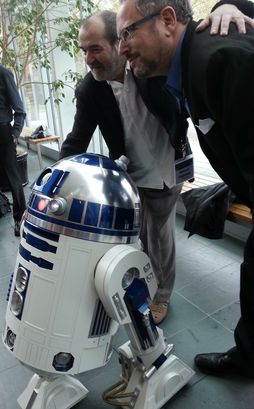When content wanted to be free
A long-running motif on the TV show Mad Men has been the conflict between the numbers guys - Harry Crane (Rich Sommer) and Jim Cutler (Harry Hamlin) - and the creative folks - Don Draper (Jon Hamm) and Peggy Olson (Elisabeth Moss) - who want to do inventive work that inspires emotional connection. As the discussion on the WELL concluded, the success of Google's all-text contextual ads says the numbers guys have won. For now.
This week, two German publishers lost in court against the creator of the browser plug-in Adblock Plus, which, like you'd think, blocks web ads for an increasing number of users worldwide. The publishers' contention: that Adblock Plus is "illegal" and "anti-competitive". Adblock Plus's project manager, Ben Willliams, welcomed the precedent on his blog, hoping it will help his company avoid future expense and resource drain "defending what we feel is an obvious consumer right: giving people the ability to control their own screens by letting them block annoying ads and protect their privacy".
Williams concludes by suggesting that publishers should work with Adblock Plus to develop non-intrusive forms of advertising and "create a more sustainable Internet ecosystem for everyone". Adblock Plus implements this by whitelisting sites (the largest of which pay for the privilege) that run acceptable ads. Cue the arms race: the fork Adblock Edge still removes all ads. As of June 2014, PageFair counted 150 million ad blocker users (PDF), up 69% from 2013.
I have to admit to some inner conflict here, because those who argue that blocking ads is theft have a point. I am indeed accessing content whose existence (and whose writers) is being financed by advertisers without the quid pro quo of my attention. If everyone does this, the whole shebang - including a chunk of how I make my own living - is unsustainable. I should be wracked with guilt. It's just that the ads make me hate the companies that pay for them, and I can't read a web page full of fine print with animations in my face. Similarly, it's hard to enjoy - or even follow - a US television show when it's interrupted by eight minutes of ads per half hour and each one is delivered at a volume easily 1/3 higher than the program I'm there to see. I plead in return that I buy DVDs, magazine subscriptions, and books, and contribute my own share of free content to the web, but that doesn't pay the same content providers. What seems particularly unreasonable to me is double-dipping: ads in situations where we already pay for admission. That would include DVDs; movie theaters; premium TV channels; the Transport for London phone app; sports stadia during live events; and on purchased clothing.
So the question remains: for the large chunk of the web that is financed solely by advertising, do we want professional content or not? If we do, how do we propose to pay people to create it?
It turns out that this question was considered in 2012 by Tim Hwang (last seen at We Robot 2015) and Adi Kamdar in their paper: Peak Advertising (PDF). The paper makes the explicit analogy between the diminishing effectiveness of online advertising and the diminishing returns after peak oil, if the energy required for extraction is greater than we can retrieve. The authors consider four indications that we might have reached the point of diminishing returns, and go on to speculate about how content on the Internet would have to evolve if it can no longer rely on advertising support as its dominant financial model. I found it a few months ago when I had the same thought: for many quarters now Google's revenues per click have been dropping (its latest results, released yesterday, continue the trend), and overall it seems impossible that there can be enough advertising in the world to pay for all the things people want to support that way.
Hwang and Kamdar highlighted three problems with the status quo in addition to the constant rise in ad blocking: demographics - advertising tends to reach the oldest (read: least desirable) customers; the click fraud; and escalating ad density (the kind of saturation that sends Americans to fast-forwarding DVRs rather than watch eight minutes of ads per TV half hour). Hwang and Kamdar predicted that over the next decade falling revenues will encourage consolidation and monopolistic markets for online services because only the largest vendors will have sufficient inventory to remain profitable. In addition, they predicted an increasing interest on the part of advertisers in collecting more and more (and more privacy-invasive) data about users. Finally, they predicted a rise in essentially unblockable content - that is, "sponsored" stories and product placement. As evidence they were on the right track, I offer the UK Internet Advertising Bureau's discussion of "native ads" ("make advertising part [of] the content experience").
![]() "The end of the Internet as we know it," they said on Usenet when the first ad went up. Recalcitrant users: a disruptive technology.
"The end of the Internet as we know it," they said on Usenet when the first ad went up. Recalcitrant users: a disruptive technology.
Wendy M. Grossman is the 2013 winner of the Enigma Award. Her Web site has an extensive archive of her books, articles, and music, and an archive of earlier columns in this series. Stories about the border wars between cyberspace and real life are posted occasionally during the week at the net.wars Pinboard - or follow on Twitter.


 At the March 2015
At the March 2015